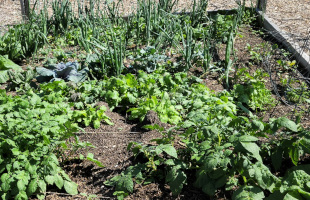
Blackberries are good to eat and easy to grow. They may be a bit too easy to grow, as they are weeds in some areas. What this means is that when planning your blackberry growing area you must be able to keep them from spreading too much.
How Blackberries Grow
Blackberries, however, have been somewhat domesticated and produce loads of tasty berries. These berries make it worth the trouble to grow the blackberry. Blackberries produce berries on canes that are a year old, so won’t bear for the first year after they are planted. They make you wait a year to get their goodies.
Soil and pH Needs
Blackberries like well-drained, sandy soil with a ph of 4.5 to 7.5. They really grow best at a ph of around 6.0 to 6.5. Blackberries will grow in the black gumbo we have here and really thrive in raised beds.
Spacing
Blackberries are usually planted from cuttings or from bare-root plants and are planted in late December or January in Texas. In other climates, plant them in the dormant season. These plants take up a lot of room, so space them three feet apart and keep the rows eight to twelve feet apart. The plants will eventually grow to form an impenetrable hedge if you let them, so bear that in mind when planning your garden. The other thing to bear in mind is that copperheads and rattlesnakes love blackberries, so do not put them too close to the house or where children play.
Trellising Blackberries
Blackberries can be trained to grow on a trellis so that they are easier to harvest. Growing the blackberries on a trellis also promotes better air circulation, which keeps the plants healthier. This article from North Carolina Extension includes instructions for building the trellis and training the plant to grow on it.
Pruning Blackberries
Blackberries have to be pruned. The first year, cut your canes back when they reach 36 to 48 inches by cutting off a third of the cane. This encourages branching of the plant. In the second year, floricanes emerge. These are the canes that have flowers on them and that produce the fruit. After all the fruit is ripe, the floricanes die and should be cut away. Cutting them away immediately after harvesting the fruit leaves more resources for the plant to produce more floricanes and to grow.
Remove Weeds
Weeds compete with the blackberries for resources, so keep your plants weeded. Removing the weeds also keeps down vermin who like to steal your berries.
Watering
Blackberries require irrigation, and drip irrigation is the most efficient. You should start watering the plants about March and continue through September when you taper off. During the winter, you water very little to keep the plants dormant.
Fertilizer
Blackberries require nitrogen fertilizer but rarely anything else. Fertilizer is spread along the row at bloom and at the recommended levels for your soil. This will vary depending on your soil chemistry. A soil test will let you know how often you need to apply nitrogen and how often you need to do so.
Diseases and Pests
Blackberries can get several fungal and bacterial infections. The best prevention here is making sure weeds are removed, using drip irrigation, and making sure the plants have plenty of air circulation. Blackberries should be checked frequently for pests and treated as needed. Your Extension Agent can identify any pests or diseases you find from a sample you provide. They can then give you an idea of what to use to control the problem.
Harvesting Blackberries
Blackberries are really easy to grow. They have lots of fruit. Wear a long sleeve shirt to pick them to protect against thorns and refrigerate the berries as soon as possible after picking. Pies, cobblers, and other tasty things can then be made.

Want to learn to garden? My first attempt at gardening ended up in failure. The weeds took over and squeezed the vegetables out. I was very frustrated by this waste of good seed, time, and money. So I became a master gardener and spent a lot of time helping other people avoid or overcome problems in their garden.
In order to help others garden successfully, I have written a book, Vegetable Gardening from the Ground Up, available in an ebook or a paperback from Amazon. It is also in Kindle Unlimited.

